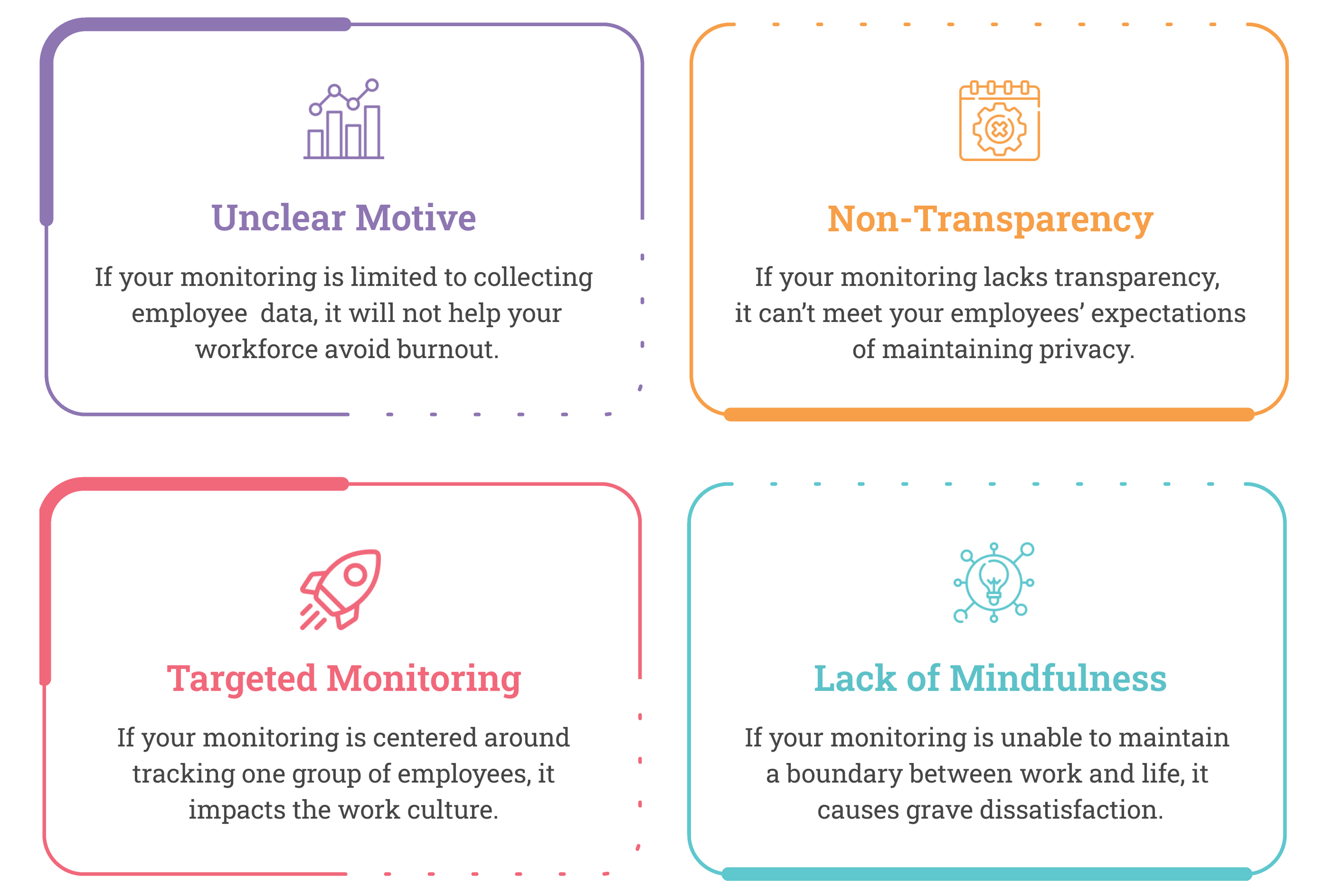The growing remote work is encouraging the use of employee monitoring software. A report from ExpressVPN states that around 80% of employers do employee monitoring to evaluate how their remote teams work and what online activities they perform. Even some managers have gone far with employee monitoring as they use it to record calls, messages, and emails to estimate performance.
Stats reveal that employee monitoring software was searched 75% in March’20 in comparison to the previous year of 2019, while its demand stood strong in the coming years of 2021 and 2022.
Table of Contents
The evolving work culture has given rise to the need for monitoring employee activities. With the increasing monitoring practices, especially in remote organizations, the concerns are equally increasing about the use of monitoring software and employee privacy.
Let’s learn how it impacts the employees and the work, and what counter-effects it brings to the workplace:
Signs you’re being monitored at work and its impact
Your manager checking in frequently with your productivity report hints you’re being monitored. If it’s done the way employees can better their performance, such fair monitoring helps, otherwise it causes dissatisfaction and distrust among employees.
Let’s learn what can be defined as unjustified employee monitoring:

– Unclear motives
If your monitoring is limited to collecting employee data, you need to reconsider because it will not help your workforce avoid burnout, boost morale, and balance workload.
– Non-transparency
If your monitoring lacks transparency, it can’t meet your employees’ expectations of maintaining a certain level of privacy and causes violations.
– Targeted monitoring
If your monitoring is centered around tracking one group of employees, it impacts your organization’s work culture, lowers employee morale, and triggers a sense of unfairness.
– Lack of mindfulness
If your monitoring is unable to maintain a boundary between work and life, it causes grave dissatisfaction among employees.
…and, ultimately the purpose of monitoring will fail.
Let’s learn how unfair monitoring can impact employee engagement:
– Employees feel targeted, that leads them to disengage from work
– Employees facing privacy invasion start distrusting the organization
– Employees get impacted by lower productivity and retention
– They discontinue working in a hostile environment
Define a fair employee monitoring policy for your organization
Employee monitoring doesn’t mean tracking and you can draw purposeful benefits from it by defining it in the way it serves fairness, transparency, and justice to the employees in your organization:
– Communicate your monitoring approach with employees
Clearly communicate your monitoring approach with your remote teams to help them understand its benefits. Discuss what monitoring parameters will support them and how they can improve performance.
– Define productivity parameters that need to be monitored
Decide on the productivity parameters that you’re going to monitor and keep your remote teams informed. Help them understand how productivity analytics support them to perform and align with the business goals.
– Ensure your monitoring policy relates to all employees
Create a unified monitoring policy for all your remote employees and negate the chances that any employee feels targeted. Differentiate your monitoring policy where needed like for remote teams working with personal devices, etc. to cover all important remote work aspects.
Read More: How to Ensure Compliance in Hybrid Work Environment
Embrace employee monitoring ethics to support your workforce
Practice transparency while establishing and implementing the employee monitoring policy that will help win the confidence of your remote teams and they will improve performance by gaining productivity insights to make monitoring a success.
A few noteworthy points to establish an effective and ethical monitoring policy to enhance productivity in remote work:
– Simple and understandable
Keep the language simple while writing the monitoring policy so your remote teams can easily get it. Communicate any changes or updates to the policy with your remote teams by allowing them access to the policy document.
– Inclusive of important details
Include all the important details and limitations in the policy document for employee monitoring related to app & web usage, activity tracking, location monitoring, etc.
– Make it readily available
Make the policy document readily available to your remote teams by letting them have easy access to its digital copy.
– Discuss with your teams
Discuss with your remote teams about the policy and how it’ll benefit them in improving their performance. By clearly communicating the value that employee monitoring software will bring, you can win employees’ confidence in implementing the policy and gaining the benefits.
Create justifiable employee monitoring example
Avoid employee monitoring from turning into micromanagement, or invasive surveillance. Instead, it should serve the purpose of measuring remote teams’ performance, eliminating inefficiencies, and optimizing business operations.
Read More : What can employee monitoring software do
Benefits of ethical employee monitoring in the workplace
Ethical monitoring keeps its scope aligned with improved employee productivity and better business outcomes. The absence of ethical monitoring practices can result in extreme surveillance breaching employee privacy and triggering distrust. Let’s learn how exercising ethical employee monitoring can gain you advantages:
– Boost employee productivity
Track how your remote teams perform and what impacts their productivity. Whether it is the apps or websites they visit, exceeding idle/break time, or fewer working hours. Identify and control their unproductive hours to encourage more productive work.
– Optimize work hours and business operations
Help teams follow an active work routine by monitoring their login/logout times and identifying inconsistencies. Encourage them to maximize their work hours by limiting their exceeding idle/break/aux time which helps optimize business operations.
– Secure employee privacy and important data
Restrict monitoring only to employee hours to keep the work-life balance intact. Track how remote teams behave to trigger automated actions against risky behavior and negate data/compliance violations.
Eliminate the scope of making your remote teams feel targeted by adopting ethical monitoring practices and keep them more engaged in work than worrying unnecessarily about micromanagement, privacy, and work-life balance.
Let’s discuss how we can help you establish an ethical policy. And, for effective employee monitoring, you can start a free trial to get a firsthand experience today.
How can I implement employee monitoring software?
The fair way of implementing an employee monitoring policy is to communicate with your remote teams about how the policy will be implemented and how it will help improve their performance.
Why is it important to keep employees informed about monitoring?
Maintaining transparency is important while establishing and implementing employee monitoring as it keeps employees informed about the policy, changes to it over time, and its scope, which saves employees from distrusting the organization.
What are the ethical concerns with remote employee monitoring?
Monitoring, if not done ethically, can breach employees’ work-life balance and privacy, which triggers dissatisfaction among remote teams; while doing it ethically helps boost employees' morale and improves their performance.
What are effective ways to monitor employees’ computer activities?
Capturing employee screens with screenshot monitoring can help you know what tasks employees are doing and with what efficiency. Here, informing employees about how you’re going to do it and how it will benefit them is important, so they don’t get shocked or dissatisfied with your uninformed monitoring move.




